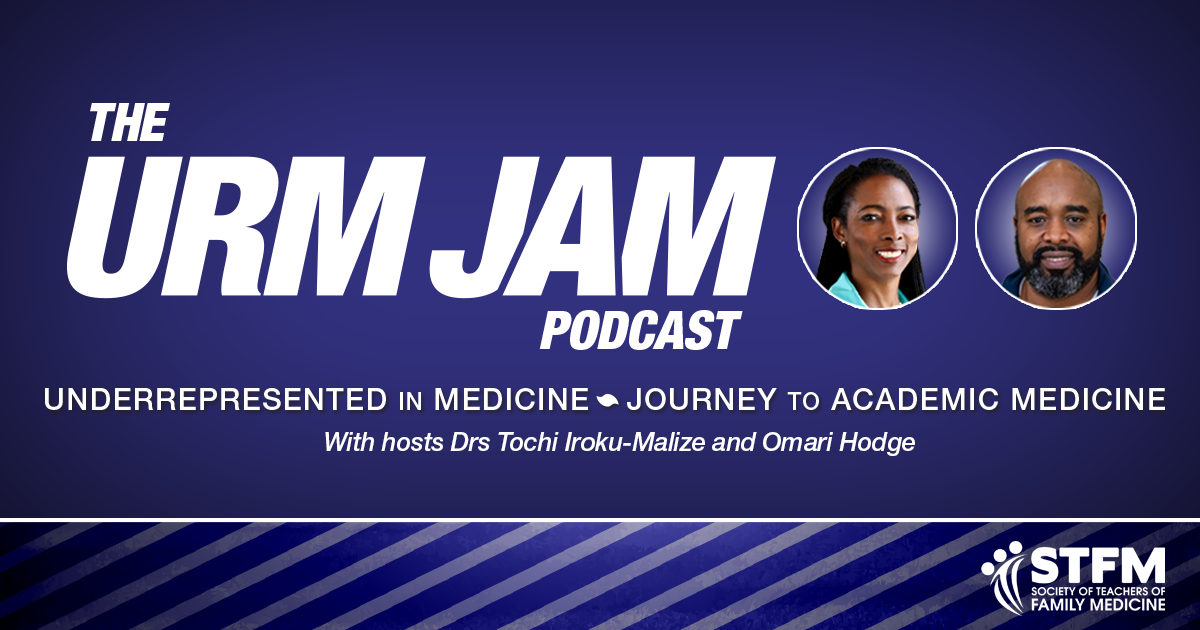In this podcast, we address the real and perceived barriers faced by historically Underrepresented in Medicine residents and students when considering a career in academic family medicine. Our hosts and guests will provide practical tips and personal advice on topics like leadership, scholarly activity, CVs, mentorship, and more.This podcast is developed by the URM Pipeline Workgroup as part of the STFM URM Initiative with funding by the ABFM Foundation.
Related Underrepresented in Medicine Resources
Episodes of the URM JAM Podcast
- Episode 1: Our Journeys to Academic Medicine
- Episode 2: An Inclusive Environment within Academics with Viviana Martinez-Bianchi, MD
- Episode 3: Building Your Academic Portfolio and CV with Renee Crichlow, MD
- Episode 4: Your Leadership Voice Is Important with Jeannette E. South-Paul, MD
- Episode 5: Scholarly Questions Make Us Better Doctors with John Delzell, MD, MSPH
- Episode 6: Counteracting the Minority Tax for URM Faculty
- Episode 7: Demystifying Graduate Medical Education with Riba Kelsey, MD, FAAFP
- Episode 8: Caring for Underserved Communities with Harry Strothers III, MD, MMM
- Episode 9: The Power of Effective Feedback in Medical Education
- Episode 10: Navigating STFM Resources for Academic Medicine with Emily Walters
- Episode 11: Understanding the ACGME’s Role in Graduate Medical Education
- Episode 12: Elevate Your Poster Presentations with Louise Jones, PhD, MEd
- Episode 13: How Family Medicine Can Address Implicit Bias and Microaggressions with Danielle Jones, PhD, MPH, and Ashley Bentley, MBA, CAE
- Episode 14: Shaping Family Medicine through Scholarly Writing with José Rodriguez, MD
- Episode 15: Create Engaging Didactic Sessions with Cleveland Piggott, MD, MPH, FAAFP
- Episode 16: Serve Your Community Through Family Medicine Advocacy with Jehni S. Robinson, MD, FAAFP
- Episode 17: Know Your Worth During Contract Negotiations with Kendall Campbell, MD
- Episode 18: Be Prepared to Step Into Leadership Opportunities with Tricia Elliott, MD, FAAFP
- Episode 19: Cultivating Health Literacy Skills in Academic Medicine with Benjamin Franklin Simmons III, MD
- Episode 20: Creating an Effective Medical Curriculum with Alice Fornari, EdD, RD
- Episode 21: The Goals of STFM’s URM Initiative with Judy Washington, MD, FAAFP and Edgar Figueroa, MD, MPH, FAAFP
- Episode 22: The Power of Mentorship with Byron Jasper, MD, MPH
- Episode 23: Finding a Path to Academic Family Medicine with Maili Velez-Dalla Tor, MD, FAAFP
- Episode 24: Finding a Career Pathway in Academic Medicine - Live Q&A with Residents
Meet the STFM URM JAM Podcast Hosts


Questions?
If you have questions about the podcast, email Rusty Nail using the link below.
EMAIL QUESTIONS
